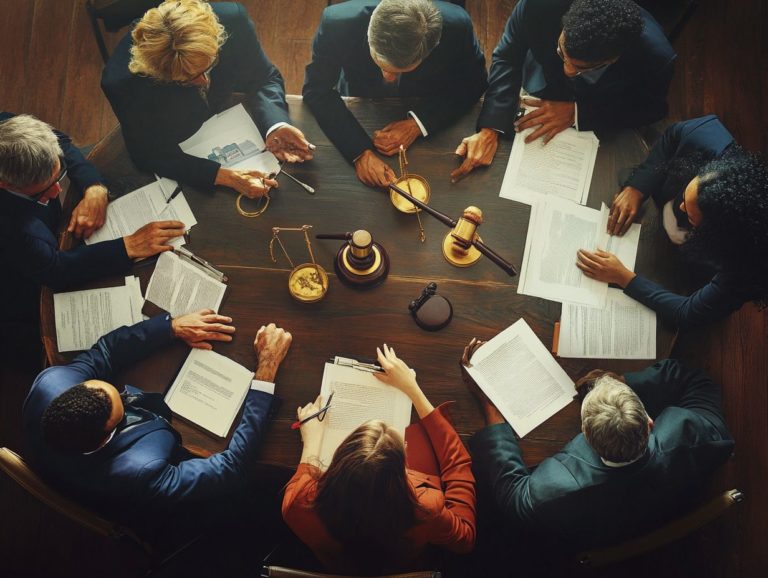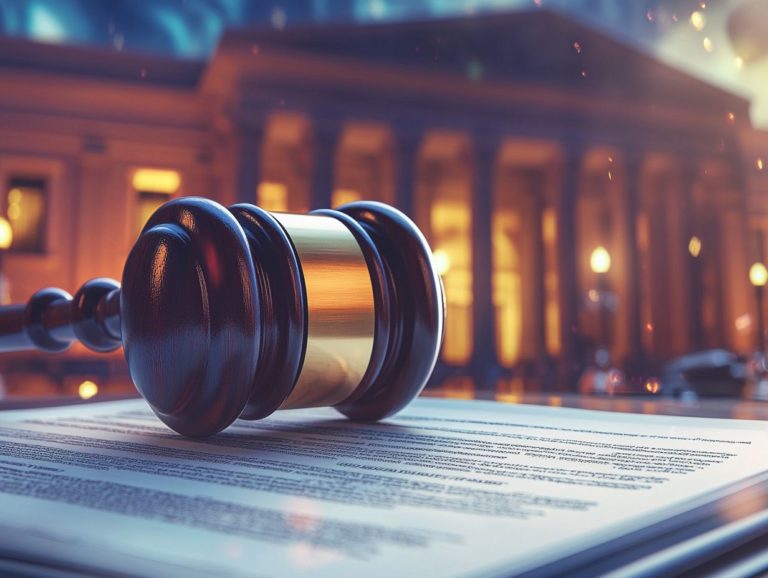The Right to Access Evidence Before Trial
The right to access evidence stands as a cornerstone of a fair judicial process, empowering you to prepare your case thoroughly and uphold the principles of due process.
This article delves into what this right encompasses and why it is vital for sustaining justice. It highlights the importance of access to evidence in ensuring a fair trial. It also explores the limitations and exceptions that may come into play and outlines the legal procedures you can follow to exercise this right.
Furthermore, it explains the potential consequences of violating this right, offering you a comprehensive understanding of its significance within the legal landscape.
Contents
- Key Takeaways:
- Understanding the Right to Access Evidence
- The Importance of the Right to Access Evidence
- Limitations on the Right to Access Evidence
- How to Exercise the Right to Access Evidence
- Consequences of Violating the Right to Access Evidence
- Frequently Asked Questions
- What is the meaning of the right to access evidence before trial?
- Why is the right to access evidence before trial important?
- Is the right to access evidence before trial guaranteed in all legal systems?
- Can the right to access evidence before trial be limited?
- What can I do if I am denied the right to access evidence before trial?
- Is there a time limit for accessing evidence before trial?
Key Takeaways:
- The right to access evidence before trial is essential for a fair trial and preserving due process.
- Exceptions and restrictions exist to protect sensitive information and ensure fairness for all parties involved.
- Violating the right to access evidence can result in legal consequences and penalties for those responsible.
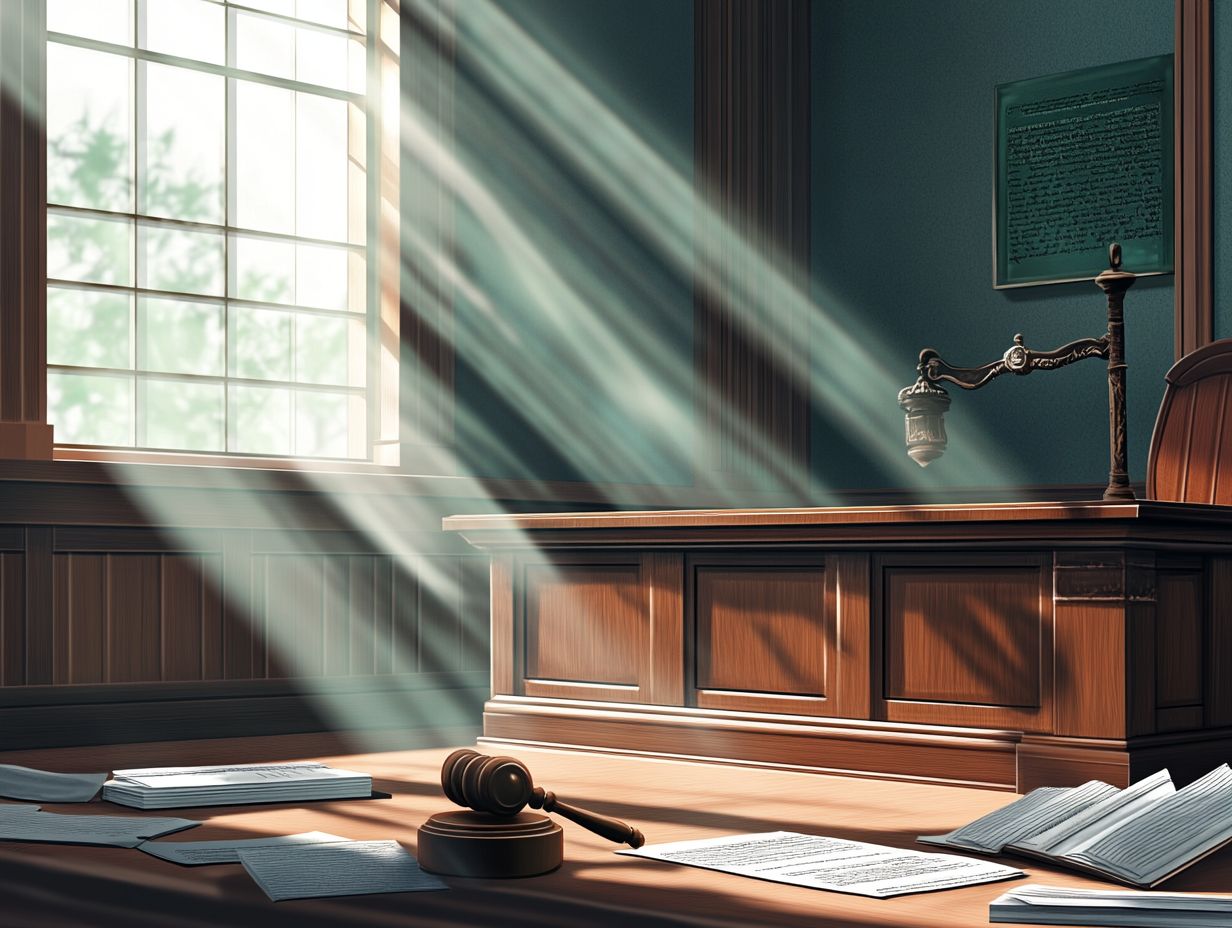
Understanding the Right to Access Evidence
Understanding the right to access evidence is critical for ensuring accountability within the criminal justice system. It involves the legal obligations that government prosecutors must adhere to under federal statutes.
This right plays a pivotal role in criminal discovery. The timely disclosure of evidence is essential for your trial preparation.
Landmark cases such as Brady v. Maryland and Giglio v. United States have established clear protocols for this process. These cases underscore the importance of evidence concerning due process and the rights of defense attorneys to effectively challenge witness testimony.
What is the Right to Access Evidence?
The right to access evidence allows you, as a defense attorney, to obtain crucial information for preparing a fair trial and affirms the right to challenge evidence in court. This ensures that all relevant evidence is disclosed by the prosecution team.
This principle is supported by significant federal statutes and landmark Supreme Court decisions, particularly Brady v. Maryland and Giglio v. United States. These cases highlight the prosecution’s obligation to share evidence that could sway the trial’s outcome.
By mandating transparency in evidence disclosure, these rulings empower you to build stronger cases, challenge the prosecution s narrative, and uphold a balanced legal process. Ultimately, your commitment to accessing evidence not only bolsters the rights of the accused but also enhances the integrity of legal proceedings, cultivating public confidence in the judicial system.
The Importance of the Right to Access Evidence
The significance of the right to access evidence is essential for fair legal proceedings. It guarantees that all parties involved in a criminal trial have equal access to critical information necessary for effective preparation.
This right is vital for the credibility of witness testimony and the overall integrity of the judicial system. It compels the prosecution to disclose all relevant evidence, thus protecting against wrongful convictions and upholding fairness in trials.
Ensuring a Fair Trial
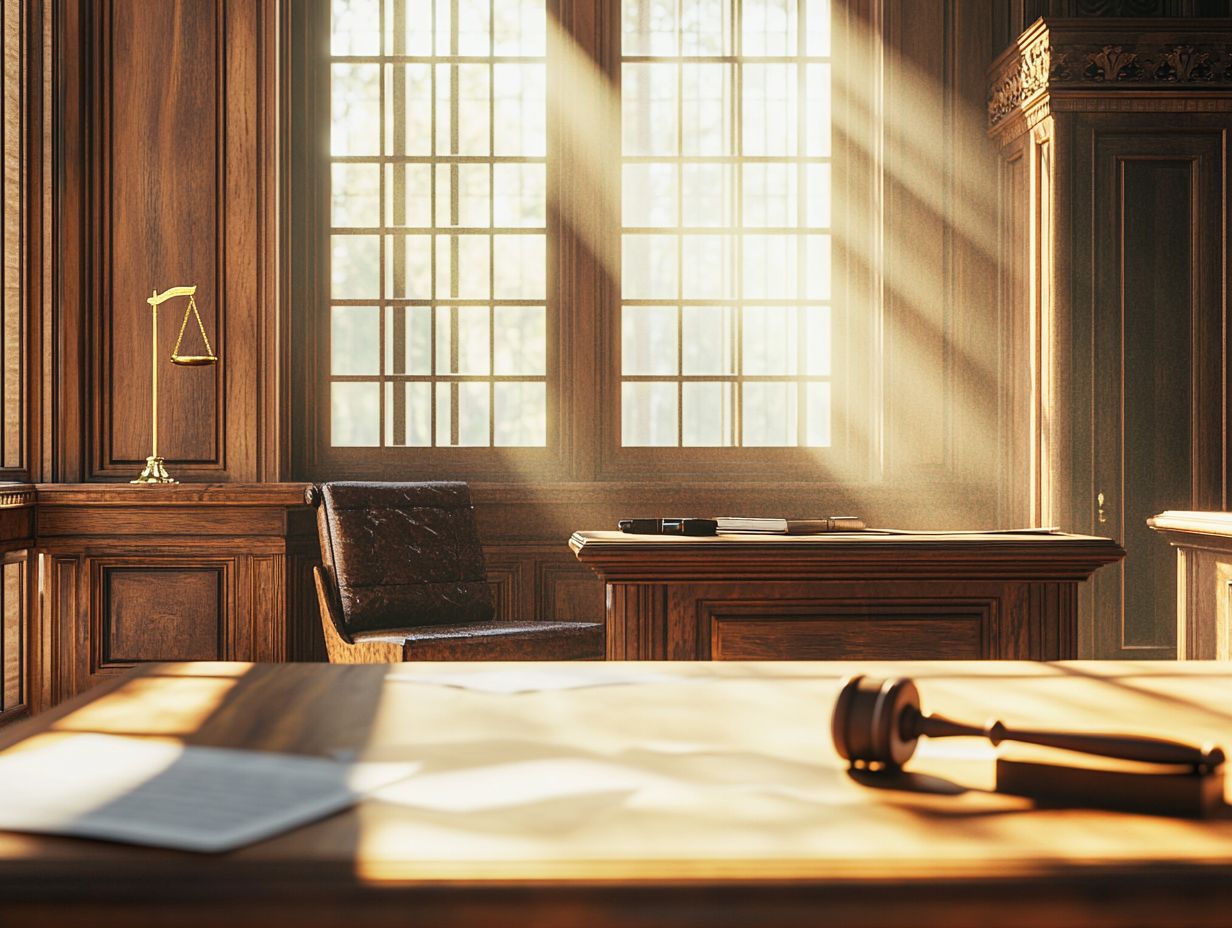
Ensuring a fair trial is a cornerstone of the legal system, and your right to access evidence is fundamental to achieving this goal. It gives the power to defense attorneys to challenge witness testimony and scrutinize the prosecution’s case effectively.
In the landmark case of Brady v. Maryland, the Supreme Court underscored the essential role access to exculpatory evidence plays in upholding justice. The prosecution’s failure to disclose evidence that could have exonerated the defendant not only jeopardized the trial’s integrity but also negatively impacted the fairness of the judicial process. Withholding such crucial information can create a significant imbalance, tipping the scales of justice against the accused.
When defense teams are equipped with all relevant evidence, including items that could suggest innocence or mitigate culpability, it fosters a more equitable courtroom environment. This ultimately promotes a society where true justice prevails, ensuring that every individual receives the fair trial they deserve.
Want to understand your rights better? Dive deeper into our resources!
Preserving Due Process
Preserving due process within the criminal justice system is crucial. Your right to access evidence plays a vital role in this preservation. It mandates that the prosecution adhere to protocols established by landmark cases like Brady v. Maryland and Giglio v. United States.
These cases highlight the obligation of prosecutors to disclose evidence that can prove innocence, ensuring you receive a fair trial. When you, as someone facing criminal charges, are granted access to all relevant evidence, it promotes transparency and bolsters public confidence in the legal process.
The implications of these rulings are significant. They affect how evidence is managed and shared between parties, reinforcing the essential principle that justice must not only be done but must also be seen to be done.
By holding the government accountable, these legal precedents illustrate the critical balance necessary to protect individual rights against potential state overreach.
Limitations on the Right to Access Evidence
While your right to access evidence is essential for upholding justice, it s important to recognize the significant limitations that can arise.
These include exceptions and restrictions stemming from prosecutorial discretion, national security concerns, or the need to safeguard witness security during criminal trials.
Exceptions and Restrictions
Exceptions and restrictions to your right to access evidence may arise due to specific prosecutorial judgment. This is particularly true in cases linked to national security or when the safety of witnesses is at stake.
These limitations arise for several key reasons. They may include the need to protect classified information, which is often essential in espionage or terrorism-related cases.
Take the United States v. Zazi case, for example. The government withheld certain evidence, citing national security concerns. This posed significant challenges for the defense in crafting a comprehensive argument.
In cases involving vulnerable witnesses such as those testifying against organized crime prosecutors might limit access to their identities or testimonies to ensure their safety. Such restrictions can profoundly affect the strategies employed by defense attorneys, who may find it difficult to build a strong defense without access to crucial evidence.
The prosecution must also navigate the delicate balance between maintaining the integrity of the case and addressing public safety concerns.
How to Exercise the Right to Access Evidence
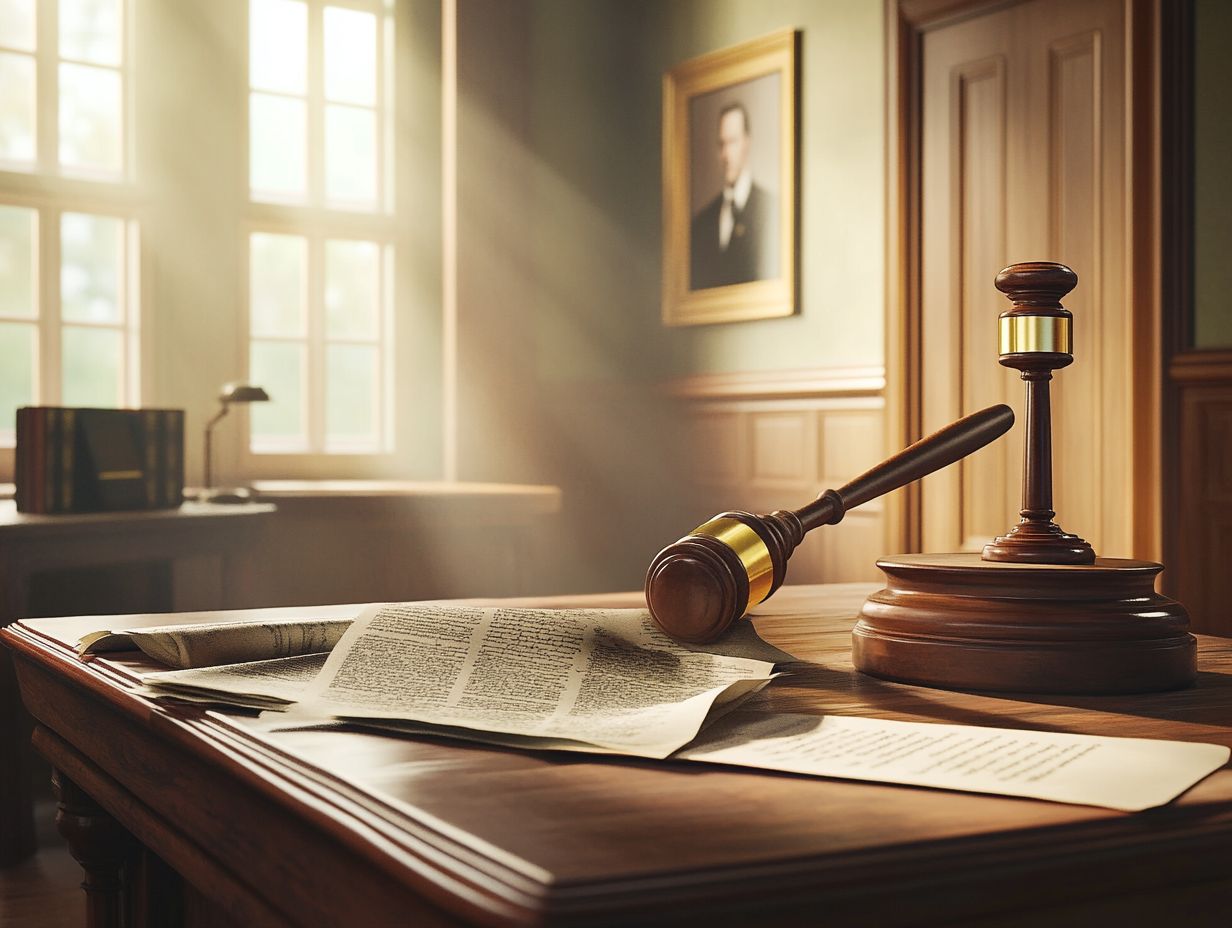
Exercising your right to access evidence demands a thorough grasp of the legal procedures and requirements governing criminal discovery. This knowledge gives the power to defense attorneys to skillfully request the timely disclosure of evidence that could prove innocence and information that could discredit witnesses from the prosecution team, ensuring that your case is robust and well-prepared.
Legal Procedures and Requirements
Legal procedures and requirements for accessing evidence are crucial for you as a defense attorney. They enable you to uphold your disclosure rights and effectively navigate the complexities of criminal discovery.
You often start by filing motions to compel. This formally requests the court to mandate the prosecution to provide specific evidence that could be vital for your defense strategy.
Adhering to court-imposed timelines is essential. Any delays can jeopardize your case and hinder your ability to prepare effectively.
Since each jurisdiction may have its own rules regarding discovery, it s vital for you to be well-versed in local procedures. Grasping these steps is vital; it not only bolsters your defense position but also highlights the importance of due process in securing a fair trial.
Consequences of Violating the Right to Access Evidence
Violating the right to access evidence can lead to serious consequences. This makes it crucial for the prosecution to adhere to due process, as established in landmark cases like Brady v. Maryland.
Understanding these implications is essential for maintaining the integrity of the judicial process. If you have concerns about your rights, consult with a defense attorney to ensure they are protected.
Legal Remedies and Penalties
Legal remedies and penalties for violations of the right to access evidence can vary significantly. These remedies may include sanctions against the prosecution team and the possibility of a retrial or even the dismissal of charges, all of which aim to uphold due process.
These legal consequences might surface as reprimands or financial penalties against the prosecutorial office. Such actions tarnish its reputation while underscoring the gravity of these oversights.
When critical evidence is withheld, the risk of the defendant’s conviction being overturned increases. This can trigger a ripple effect that erodes public trust in the judicial system.
Such repercussions serve as a deterrent for future misconduct. They reinforce the expectation that prosecution teams uphold their ethical responsibilities.
Ultimately, the impact extends beyond individual cases. It can influence strategies and policies in future prosecutions to prioritize transparency and fairness.
Frequently Asked Questions
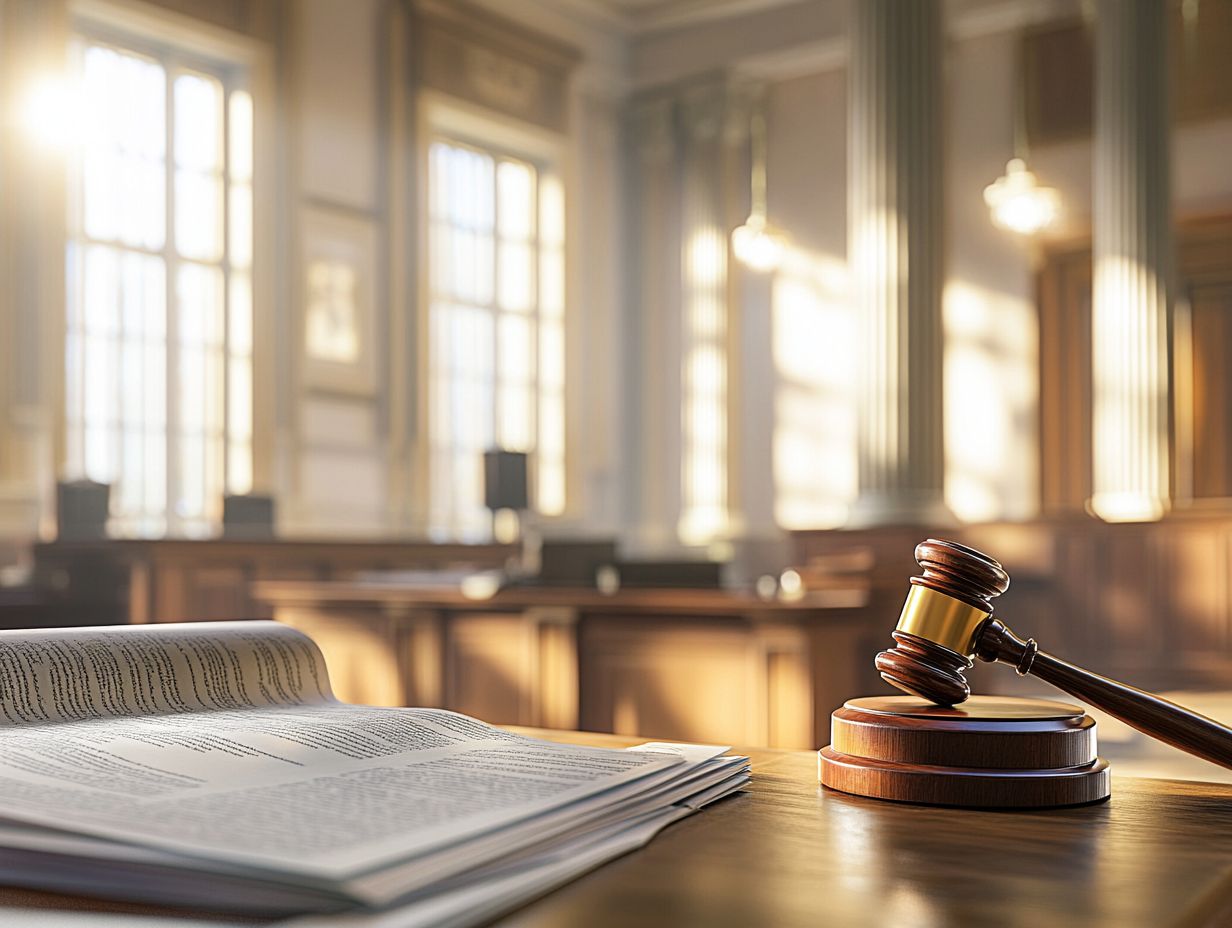
What is the meaning of the right to access evidence before trial?
The right to access evidence before trial is a legal principle that grants individuals the right to review and obtain evidence that will be used against them in a court case. This includes the right to present evidence in your defense, along with witness statements, police reports, and other relevant documents.
Why is the right to access evidence before trial important?
This right is crucial because it allows individuals to understand the case against them fully. It enables them to prepare an adequate defense and ensures that all parties can present their case fairly in court.
Is the right to access evidence before trial guaranteed in all legal systems?
No, this right is not guaranteed in all legal systems. Some countries have differing laws and procedures regarding evidence disclosure. It is important to consult with a legal professional to understand your rights in your specific jurisdiction.
Can the right to access evidence before trial be limited?
Yes, in some cases, this right can be limited. For example, confidential or privileged evidence may not be available for review. The judge can also impose restrictions on accessing and using evidence if necessary for the protection of certain parties.
What can I do if I am denied the right to access evidence before trial?
If you believe your rights are being ignored, act quickly to file a motion with the court for access. Consult with a legal professional for guidance on the proper procedures to follow.
Is there a time limit for accessing evidence before trial?
In most cases, there is no specific time limit for accessing evidence before trial. However, it is important to review the laws and procedures in your jurisdiction for applicable deadlines. Requesting access to evidence as early as possible is advisable to allow for adequate preparation time.

